
the MAM: greek lovers
RETURN TO MYTH ABOUT MYTHS PAGE
Lovers and the entire concept of love was a massive point of interest for ancients, as much as it is a point of interest for various instances of modern media. Love in ancient times came in various shapes and sizes and birthed concepts beyond the simple bonds of a single man and a single woman. Sexuality and gender was far more fluid and was also a topic of great interest to folks of antiquity.
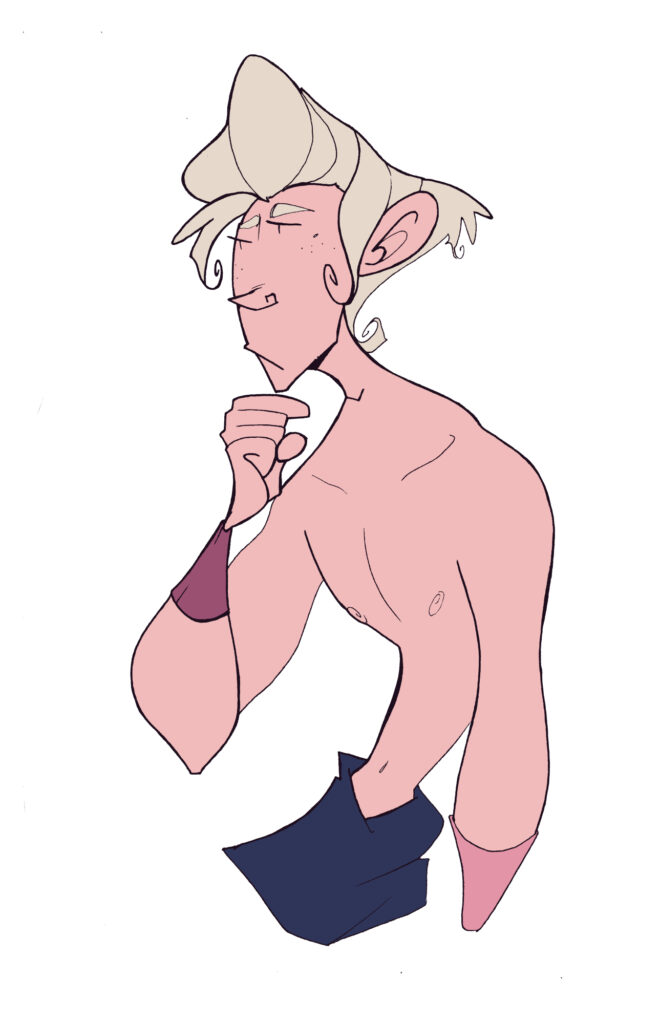
narkissos
(NARKISSOS/NARCISSUS)
Best known for being so attracted to his reflection he died of starvation.
In some versions of the myth, Narkissos was a hunter who was very well known for being drop-dead gorgeous and for being a man who was very much interested in all things beautiful. While this was a rather charming sentiment of its own… Narkissos was also a very, very proud sort of person and treated those who came to love and adore him with much more than disrespect. Oddly enough, he quite came to disdain those who loved him to the point in which his torments were so brash and callous some of his admirers killed themselves, unable to handle his displeasure towards them.
It was (and is) to nobody’s surprise his name became a term used to describe folks so proud of themselves they craved the admiration of others, admired themselves and refused to acknowledge others as being as important.
Mythology pertaining to Narkissos’s character all really ends quite the same with varying degrees of brutality. The first is the myth of Echo, in which the nymph spotted Narkissos traipsing through the woods on a (supposed) hunt. Suspecting he was being followed, Narkissos called out ‘Who’s there?’ only to have his own calls repeated to him. At length he thought to ask the voice to show herself. Feeling and anticipating great love an affection, Echo leapt from her hiding spot and into Narkissos’ arms. Unfortunately, the hunter, no less than utterly disgusted by the display, shooed her away, and stomped on her broken heart. Echo fled the scene in a flurry of tears. Nemesis, goddess of vengeance, saw the entire thing and lured Narkissos to a pond where he spotted his own reflection and fell in love with himself. Trapped in the gaze of his own image, Narkissos couldn’t bring himself to leave and instead stayed staring at himself until he starved to death.
In another version, possibly older than this recounting, Narkissos spurned many male suitors. All of these men fell for him, and none of them lived up to his own standards, including the poor, Ameinias. Ameinias was no exception, rejected by Narkissos quite brutally so, the young hunter perhaps thought this entertaining enough he even offered Ameinias his own sword before moseying off to his very… hunterly goings-on. Distraught, Ameinias preyed the gods would do something to show Narcissus the pain that he had brought down upon so many. Not realizing, this was at his own expense. The young man killed himself with Narkissos’ sword, on Narkissos’ doorstep. The hunter, seemingly quite unfazed by the display, resumed his daily routine until he fell upon a small pool of water, bent to drink from it and found his own reflection. Here he slew himself with his sword, knowing he could never have his heart’s desire… (himself)?
In both versions Narkissos’s body became flowers of the narcissus genus (including daffodils).
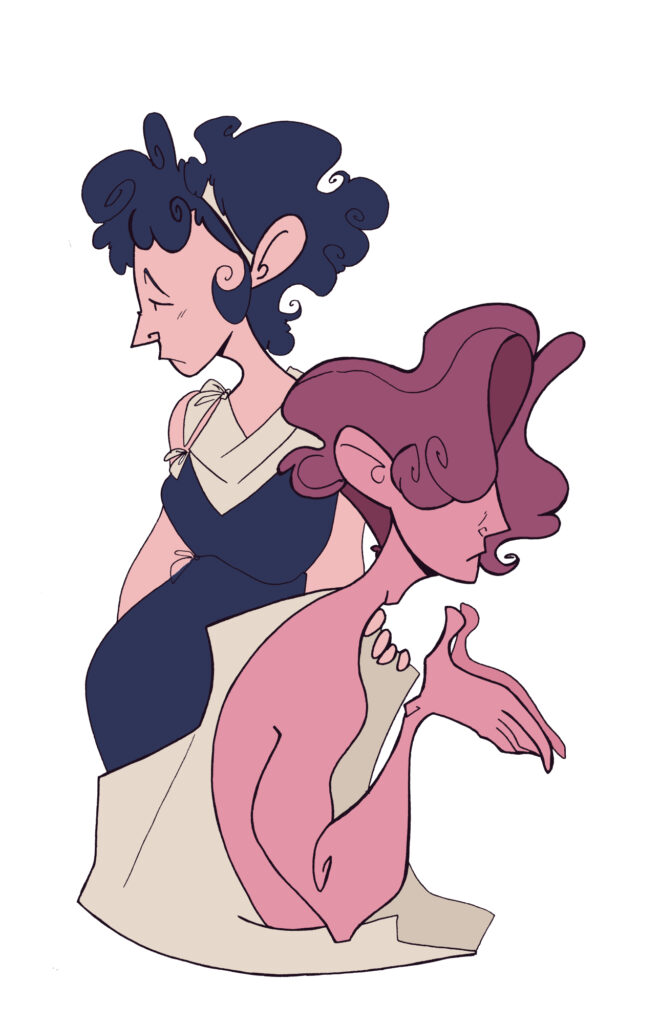
iocaste & Oidipous
(OEDIPUS/OEDIPUS REX) & (JOCASTA/EPIKASTE/EPICASTE)
Best known for being a mortal mother and son who slept together.
In some versions of the myth the idea of parents sleeping with their children or brothers with sisters was not particularly novel. However, the story of Oidipous and Iocaste was one that was shared frequently and grew into a very elaborate tragedy. This story began with Laius and Iocaste becoming parents to the famed Oidipous who was prophesied to kill his father and wed his mother and in turn, this would cause a great deal of trouble for their kingdom. Upon learning of this prophecy, Laius attempted to maim the baby and Iocaste, instead had Oidipous left on a mountainside perhaps to die via the elements (or give Oidipous a chance to grow up a normal life). Oidipous, however, was picked up by another king and queen who raised him.
When Oidipous was a grown man he learned of the prophecy attached to his name and made the assumption that it would play out for his current parents (the adoptive king and queen). The result was the Oidipous ran from this kingdom only to bump into (unknowingly) his birth father while he was on the road. Laius was real horrible to him and Oidipous wound up killing him when Laius tried to run his chariot over him. Afterward Oidipous ran into the Sphynx who stopped travellers from entering the city and when he answered the riddle given to him the Sphynx let him through and (perhaps) left. Iocaste’s brother announced that if a man could rid the city of the Sphynx he was destined to have Iocaste’s hand in marriage, thus fulfilling Oidipous’ prophecy.
The city was cursed with plague and infidelity due to this marriage and after consulting various oracles who explained that this plague would only end if the murderer of King Laius was killed (brought to justice) things would be fixed, and blind prophets who exposed Oidipous as being Laius’ killer. This set off dramatic warning bells in which Oidipous began insisting folks were lying to him until Iocaste sat him down, and attempted to distract him with the story of how she prevented prophecy from occurring with the death of her first-born son. Oidipous noticed quickly how his history and this story paralleled and came to the very horrific conclusion. Iocasta begged him to stop searching for the murderer of his father coming to the realization that it was Oidipous himself. He insisted and so dug up the mysteries of his past, that his mother was, in fact, Iocaste and his father was the old man he killed on the way.
Iocaste was mortified by this, so much so that in most versions of the myth she ran and hung herself. It was also said that in some versions after this, Oidipous, upon seeing her, took a brooch from her dress and blinded himself with it. He exiled himself and died in another kingdom far away from his own.
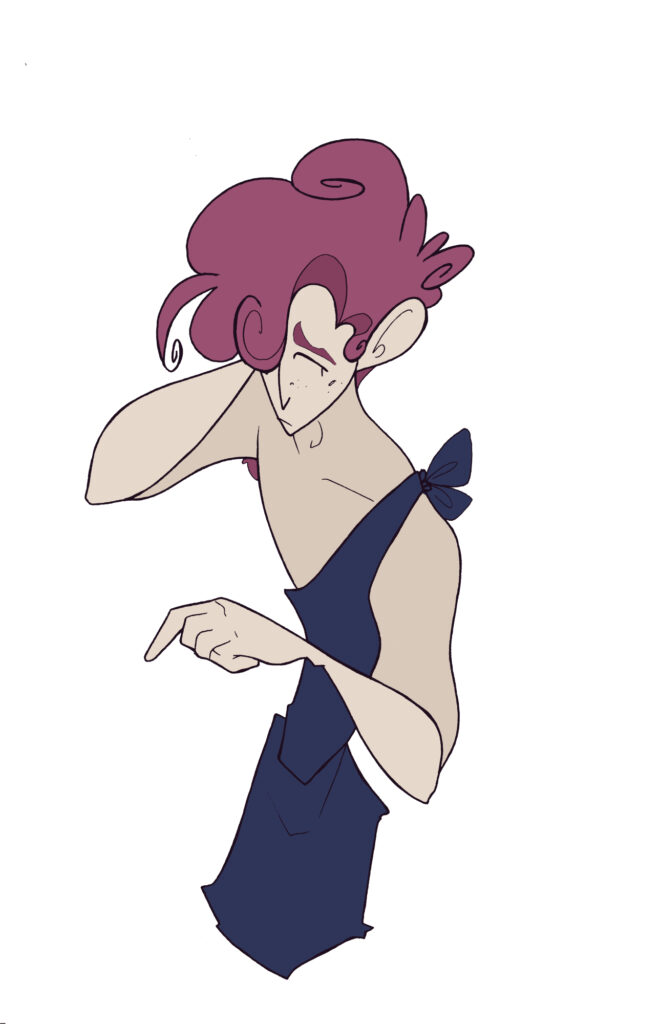
ankhises
(ANKHISES/ANCHISES)
Best known for being the one mortal too terrified to have sex with Aphrodite.
In some versions of the myth Ankhises was just minding his own business playing his lyre really well on the rolling hills while his cattle were grazing. He was approached by an exceedingly beautiful woman who he knew MUST have been a goddess and was… quite honestly? Rather terrified. She tried to get him to sleep with her, he basically told her, ‘Look, you’re damn gorgeous but nothing bodes well with having sex with a goddess’.
Aphrodite somehow managed to convince him that she was just a princess and that they could only have sex with his eyes closed. He agreed, miraculously. And when he opened his eyes after their love-making he realized she was actually the goddess of love, Aphrodite.
And then he panicked. And she was trying to get him to stop panicking, and he was still panicking, and then she told him not to tell anyone or she would smite him. And then she vanished…
…And then he told someone.
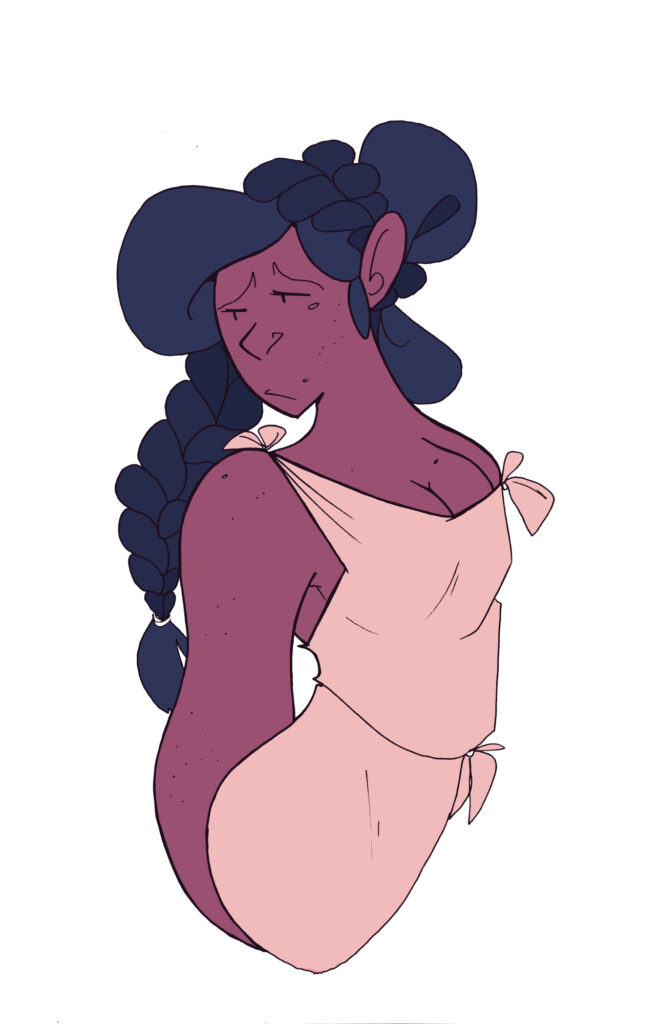
kallisto
(KALLISTO/CALLISTO)
Best known for being turned into a bear.
In some versions of the myth Kallisto was known for having a varying myth with various similar details. The first version of her myth, Kallisto took a vow of chastity and was a follower of Artemis. Kallisto was unfortunately seduced by Zeus and attempted to keep this fact hidden until her pregnancy was too visible, Artemis taking notice and becoming so furious she turned Kallisto into a bear. Later she gave birth to her son Arkas who was taken in by King Lykaon and when he was a full grown man, did not realize his mother was, in fact, a bear, and attempted to kill her, Zeus intervening and turning them into the constellations: Usa major and minor.
In another version, Zeus seduced Kallisto in the guise of Artemis. Later Artemis took notice of her pregnancy in which the two got into an argument, Kallisto blaming her for the act which naturally did not go over well.
In a final version, Hera finds out about Zeus’ tryst with Kallisto and turns Kallisto into a bear, demanding that Artemis be the one to shoot her.
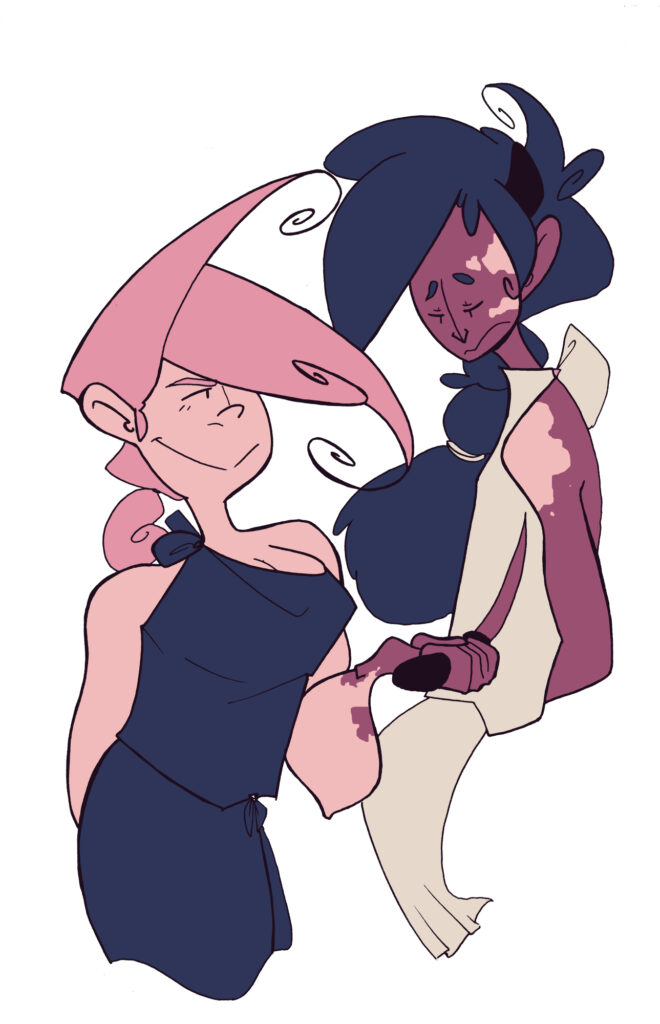
semele & IO
(SEMELE/THYONE) & (IO)
Best known for being two of Zeus’ consorts.
In some versions of the myth Zeus lusted after Semele because she was rather badass. Essentially she was one of his priestesses and one day she slaughtered a bull on his altar and, due to being covered in blood, had to wash it all off in a river. He saw this, delighted and disguised himself as an eagle so that he could make love to her.
Io, on the other hand was the result of Zeus lustful feelings for her. He turned her into a cow to avoid Hera’s scrutiny. Hera, however, was too smart for this deception and, instead, kept a close eye on the cow that was Io. Hera even enlisted the help of Argus Panoptes (a giant of a hundred eyes) to keep an eye on this particular cow. Unfortunately with his wife keeping such a close eye on the situation, Zeus could not get away with his love-making and sent Hermes to distract Argus. In the meantime, Zeus used a gadfly to pester Io until she fled all the way to Egypt where she was only turned back into her human-self to bear Zeus some more children.
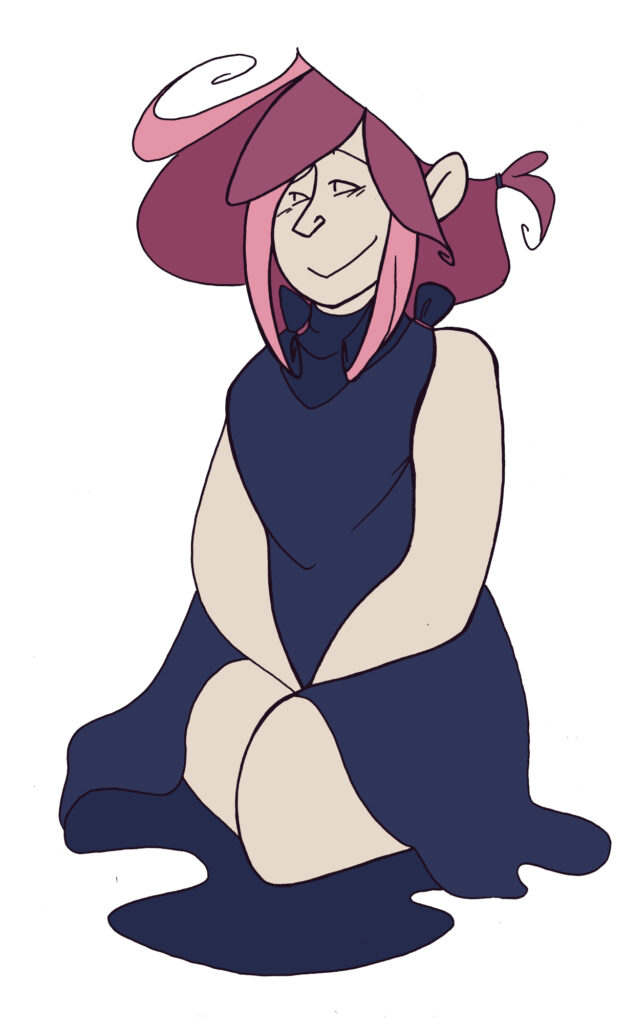
khione
(KHIONE/CHIONE)
Best known for being the goddess of snow.
In some versions of the myth, she was a rather confusing mess of a character, primarily because her name was used and re-used for various minor-characters. In some instances she was the daughter of Boreas and was the goddess mostly in charge of the winter season and the snow that came with it.
In another version she was Boreas’ wife. Boreas kidnapped Khione and brought her to his snowy hilltop where he ravished her and she wound up having a child who later took over his throne.
In other entirely different versions, Khione was the daughter of a mortal and made love with Hermes and then with Apollo before boasting of the fact that she was so beautiful she was capable of seducing not one, but two gods. Unfortunately in her hubris she also made mention that this fact made her even more beautiful than Artemis who struck her down for the comment.
In a final, much more obscure myth, Khione was turned into a snow-cloud at the hand of Hermes.
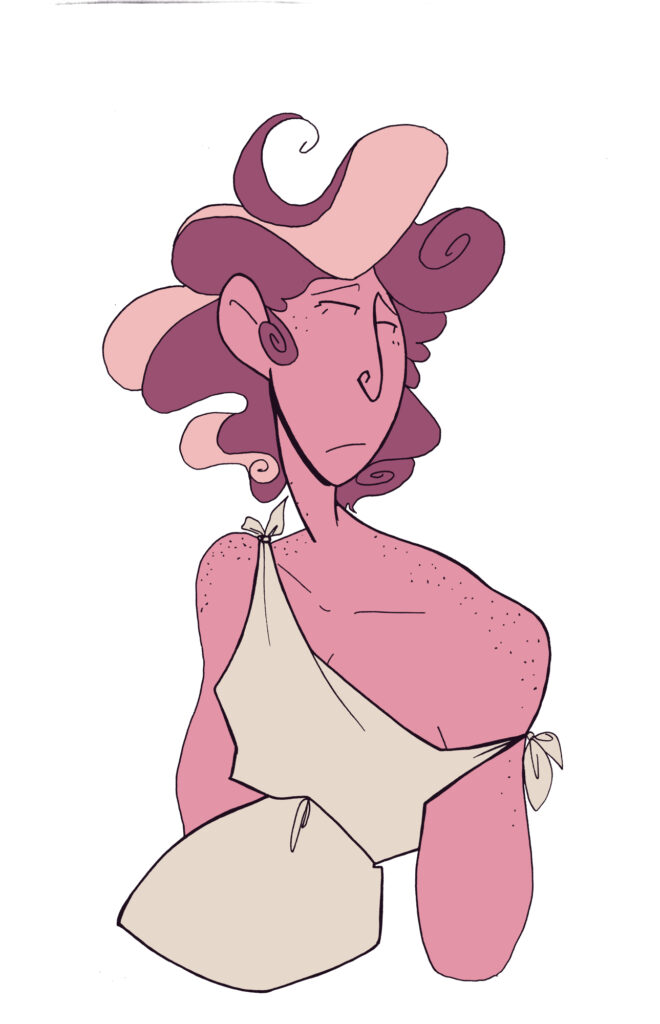
cleito
(CLEITO)
Best known for being the mother of all the royalty in Atlantis.
In some versions of the myth she was one of the (many) consorts to Poseidon and gave birth to not one… or two… but FIVE sets of twin boys. While that would have been a feat most impressive to any woman, being the consort of Poseidon meant for some very weird offspring. Five sets of twins? Not entirely the weirdest, admittedly.
Anyway, Cleito was able to play the proud mom role, watching them all grow up to become rulers of the famed lost city of Atlantis. It was said in some versions of the myth she, herself was a princess when it was first established. Of course… the unfortunate fate of the kingdom of Atlantis was to watch it sink into the ocean… never to be seen again.
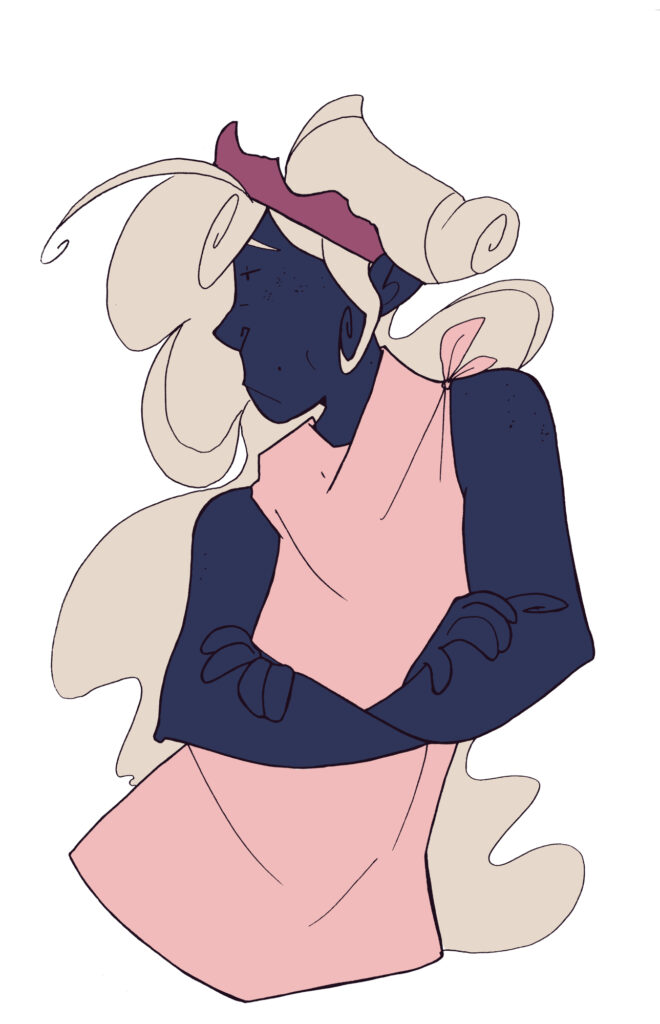
amphitrite
(AMPHITRITE)
Best known for being a goddess of the sea and… Poseidon’s wife.
In some versions of the myth she was essentially the real and true consort of Poseidon. While one might have thought that this would have lead to her name being held in high regard and with as much importance as Hera was, instead, her importance diminished over time. It was likely the fact that Poseidon had a greater habit of sleeping with various individuals and creatures of his choosing that his wife was cast aside a bit too often.
In addition to that great mess, Amphitrite was once even more important than her counterpart. Some much older myths were dug up in which she stood in Poseidon’s role and was Queen of the Ocean and was slowly usurped by her new husband.
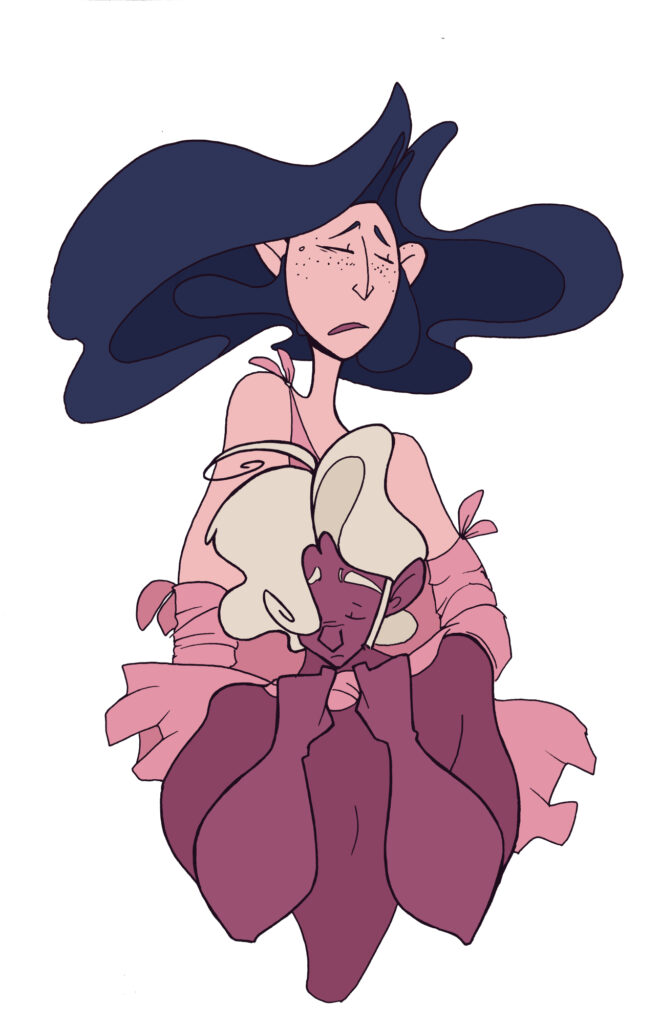
hero & leanDROS
(HERO) & (LEANDROS/LEANDER)
Best known for being one of the first Gatsby-esque tales.
In some versions of the myth Leandros fell in love with this priestess of Aphrodite, Hero, who lived on the other side of the Hellspont strait of water. Every night, needing to see Hero, Leandros would swim across the strait while Hero set a light in a tower for him to see it. One night Leandros convinced Hero that it would be completely fine for the two to make love under the guise that Aphrodite would even love it considering she was the patron goddess of love. Hero was convinced.
Unfortunately this was not exactly something Aphrodite was okay with, most definitely not from the priestess of her temple and as the seasons changed from summer to winter, Aphrodite did not protect Leandros in his swim.
During a particularly stormy night, Hero’s flame blew out as Leandros was swimming to her and he lost his way and drowned. Hero was completely devastated and threw herself off the tower so that she, too, could plummet to her death.
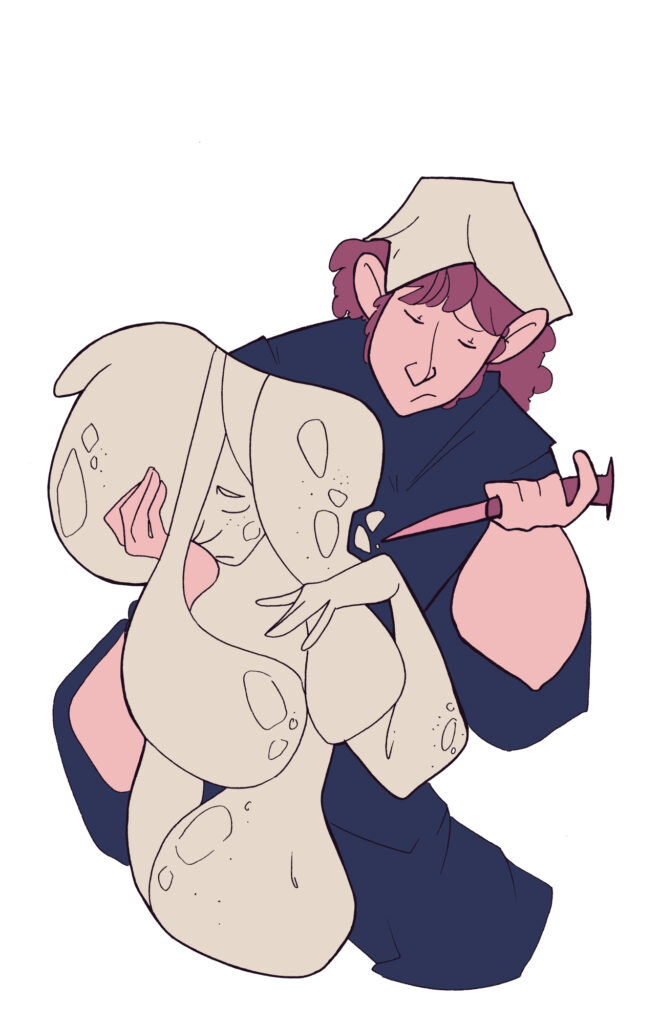
pygmalion & Galatea
(PYGMALION) & (GALATEA)
Best known for being a couple comprised of a human and… a statue.
In some versions of the myth Pygmalion was an artist and (supposedly) as artists in ancient times were way too involved in their own work… Pygmalion was no exception. He hardly showed any interests in women which folks found rather odd. Pygmalion lived his life happily sculpting and upon taking a break one day, decided to partake in the parties going on when Aphrodite’s festival came around. He played a part in the offerings and sculpted a statue in Aphrodite’s likeness in order to honour her. The poor chap fell in love with his own statue, legitimately in love, one could say he was ‘head over heels’. His love ran so deep he quietly prayed for a bride in the ‘likeness of his ivory girl’. Aphrodite, in great spirits and finding this probably both rather cute and rather funny, decided to very literally grant his wish. She let his statue come to life and in Pygmalion’s great delight perhaps made-out in Aphrodite’s temple with his… statue… Galatea.
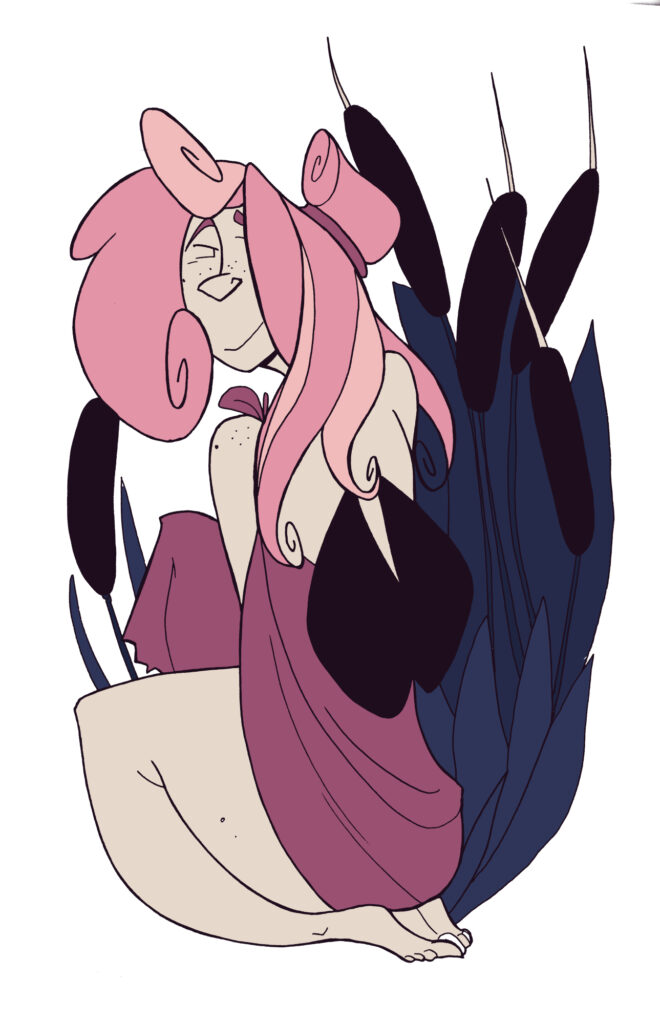
syrinx
(SYRINX)
Best known for being a nymph and follower of Artemis.
In some versions of the myth Syrinx was being chase by Pan who was absolutely, uncontrollable in his lust for her. Syrinx was not at all interested with his advances and found herself fleeing his outstretched arms. Sprinting through the forest she was caught at a river’s edge where she prayed desperately to the gods to save her from his chase. Their response was to turn Syrinx into water reeds.
This version of the myth continued on to insist that the sound of these hollow reeds was the result of Pan’s breath being blown upon them in his frustrated search of her. Giving up on his chase (or perhaps having had a minor inkling of her hide-out) cut a bunch of these hollow reeds to turn into his cute little flute.

klytie
(KLYTIE/CLYTIE/CLYTIA)
Best known for turning into a heliotrope flower.
In some versions of the myth she Klytie was the daughter of Tethys and Okeanos (making her an Okeanid/Oceanid). She was best known for pining over her true love, Helios who loved her in return for quite some time. Unfortunately the sun was quite elusive and Helios eventually grew bored of Klytie and sought out companionship elsewhere. Klytie grew jealous of Helios’ new choice of companion, told her father of the affair and the new woman’s father, appalled by the display, buried his daughter alive. Klytie only hoped that this display would earn Helios’ love back only for the sun god to grow even more annoyed and distant from her. He refused to acknowledge Klytie’s existence anymore.
Klytie wound up seating herself looking up from a rocky cliff at the sun until she was slowly turned into the heliotrope flower.
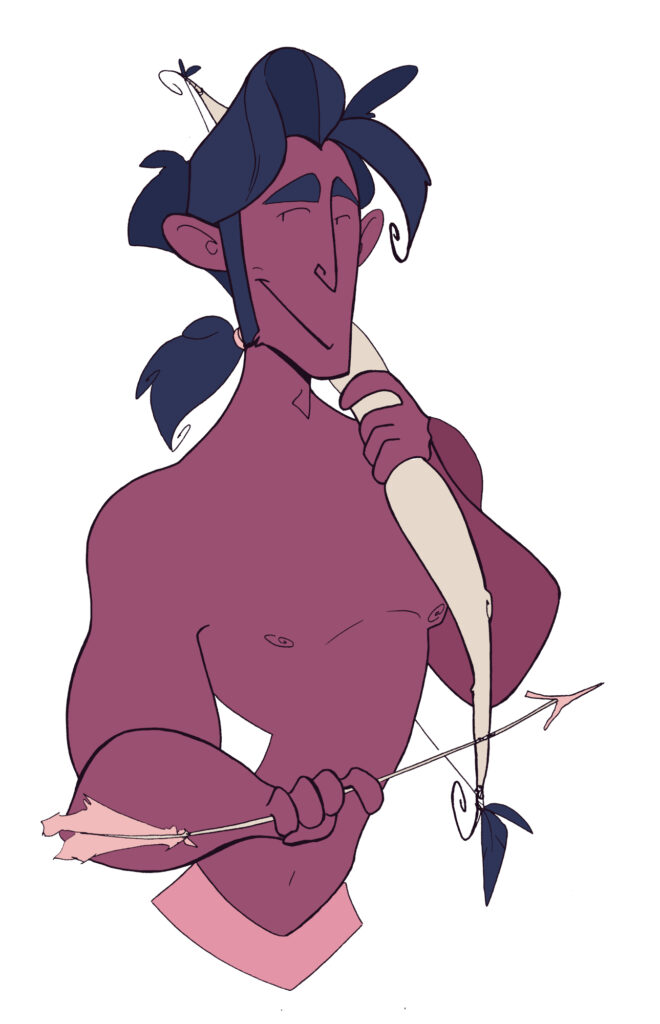
adonis
(ADONIS)
Best known for being a handsome hunter.
In some versions of the myth he was birthed from a tree since his mother was turned into this tree. He was birthed into this very handsome hunter who frolicked and hunted in the forests. At some point Aphrodite spotted him and decided to save him from the wrath of Artemis who was growing annoyed that he was killing her animals. Aphrodite put him in a box and asked Persephone to hold onto it until the coast was clear. Persephone did, but then she noticed that he was rather attractive. Persephone refused to give him back when Aphrodite came looking for him. They fought it out, Zeus had to intervene and came up with the solution that Adonis would spend one third of the year with Persephone, one third with Aphrodite and one third by himself. Adonis wound up gravitating to Aphrodite during his time off.
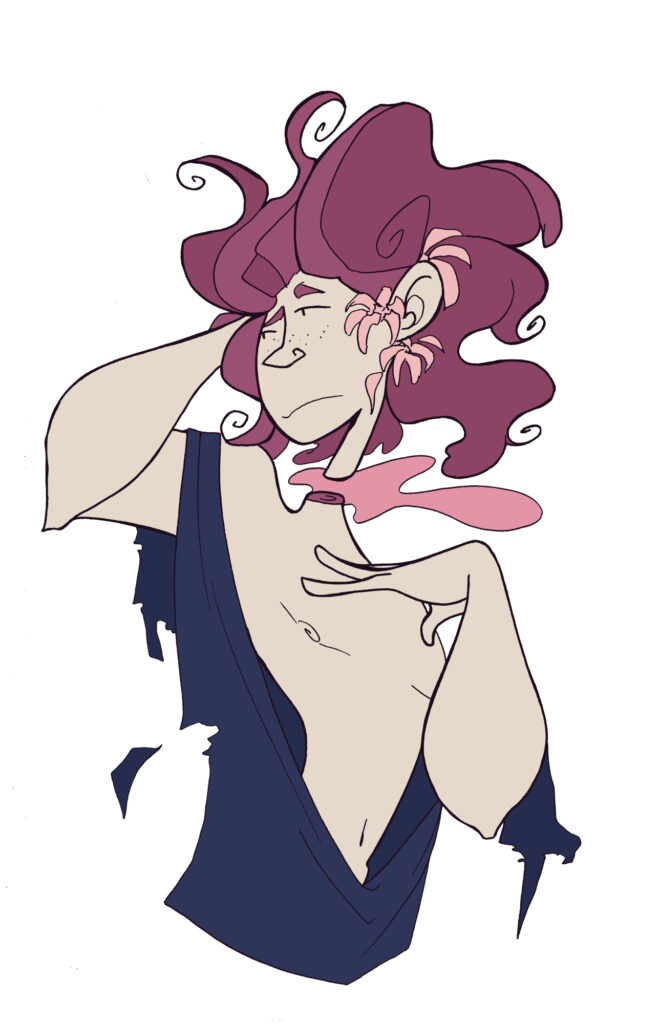
hyakinthos
(HYAKINTHOS/HYACINTH/HYACINTHUS)
Best known for being the origin myth for the hyacinth flower.
In some versions of the myth he was the lover of Apollo. He was also loved and adored by this west-wind god, Zephyros. In some instances it was a bright sunny day when Apollo and Hyacinth decided to toss a discus around. Zephyros grew jealous that Apollo was receiving all the attention from Hyakinthos out of spite he cast a wind to change the discus’ course and beheaded Hyakinthos on accident.
In a different version, the entire ordeal was all Apollo’s undoing and he was the one who accidentally beheaded Hyakinthos. It was said that in both cases, Apollo mourned so deeply he turned his lover into the hyacinth flower.
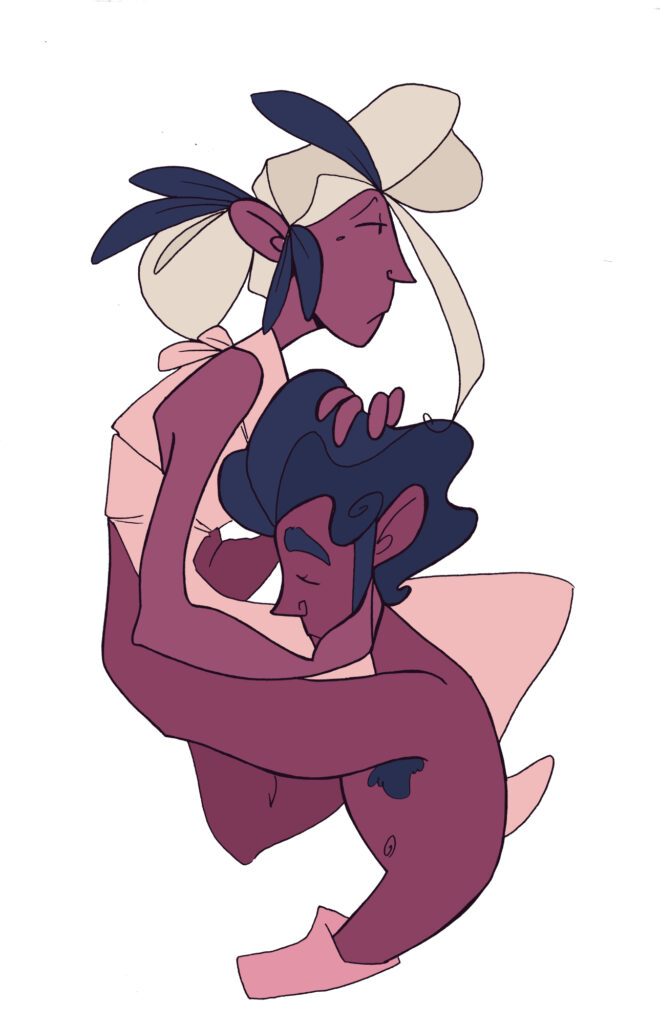
ceyx & Alkyone
(CEYX) & (ALKYONE/ALCYONE)
Best known for being the two who called themselves Zeus and Hera.
In some versions of the myth the two mortals were both rather hubristic to the point in which they deigned to call themselves the equivalent to Zeus and Hera. This sentiment, clearly went over quite well (not at all well) with the actual gods of their comparison. It was to no surprise that as soon as Ceyx went off to see, Zeus took great pleasure in smiting him with his thunderbolt, killing the man instantly.
Soon after the god of dreams himself, Morpheus appeared as Ceyx to Alkyone in a dream, explaining the terror and the ordeal. Alkyone, distraught by her loss, threw herself into the sea to drown.
Oddly enough, this death fell on the gods’ consciences enough to turn both Ceyx and Alkyone into the halcyon birds in Alkyone’s namesake.
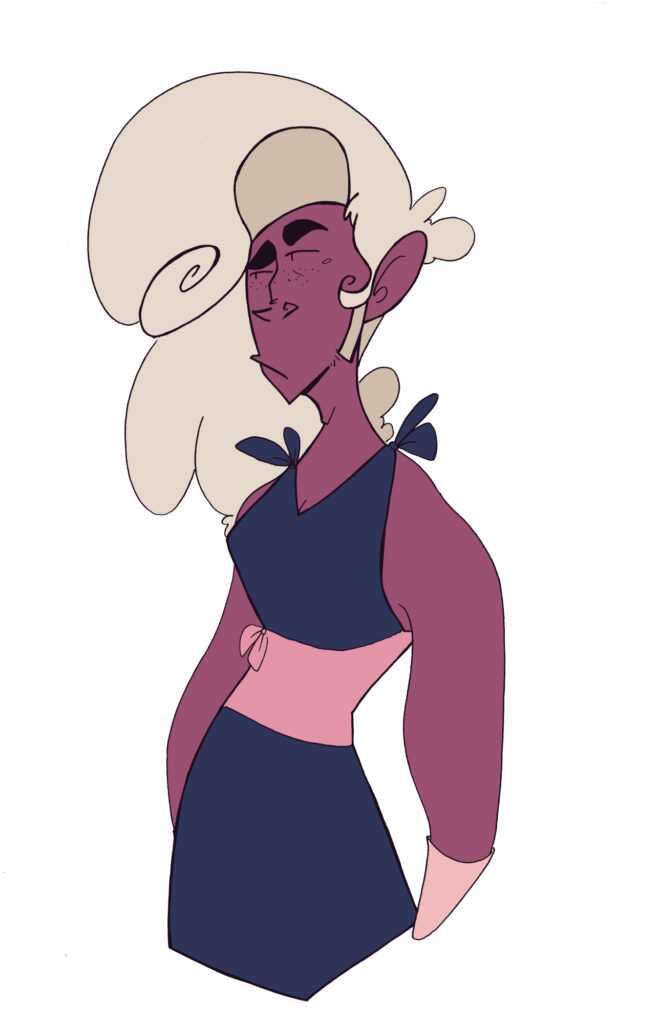
hermaphroditos
(HERMAPHRODITOS/HERMAPHRODITUS)
Best known for being a minor deity of unions, androgyny, sexuality, marriage and fertility.
In some versions of the myth they were initially birthed from Hermes and Aphrodite as a, ridiculously handsome man. Hermaphroditos took to the woods one day and allowed themself to bathe in a lake by the woods. Naturally, a small nymph fell head over heels in love with them and stalked them through the woods to this lake, watching them bathe. Unable to contain herself, the nymph followed suit, desperately praying to the gods in the hopes that the two of them might be united. Gods of mythology tended to take these requests quite literally and the two were physically united into one single individual with a combination of genitalia from both individuals. Quite enjoying this transformation, Hermaphroditos decided to pay in the hopes that this particular lake turn anyone who bathed in it, into a similarly androgynous individual.
It was also said that Hermaphroditos became (in some versions, was already born as) a winged child of Aphrodite; an Erotes.
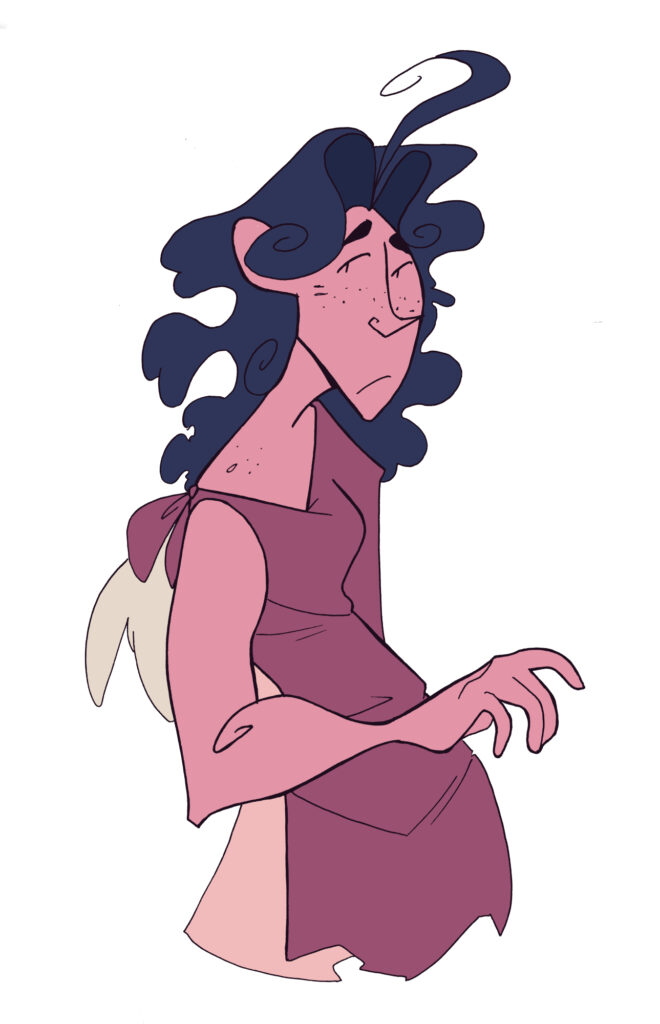
maia
(MAIA/MAYA)
Best known for being Hermes’ mother and a Pleiades.
In some versions of the myth Maia was one of the seven daughters of Atlas and primarily hung around Artemis and her groupies. Eventually she resided herself to the confines of a cave n the mountains, enjoying the peace and quiet. She was still widely known enough that Zeus’s ears caught wind of her existence and, most certainly, got it in his mind to sleep with her. He snuck into her cave one night and the two made love. Maia gave birth to Hermes and kept him there safe and sound until he grew over-night enough to crawl away and cause trouble with Apollo by stealing his cattle. When Apollo came tattling about it, Maia sided with her son and pretty much called Apollo a liar.
After this entire debacle was solved between the two boys, Maia left to seclude herself in her cave once more, keeping away from the rest of the gods, since their company never really bode well in the long run.
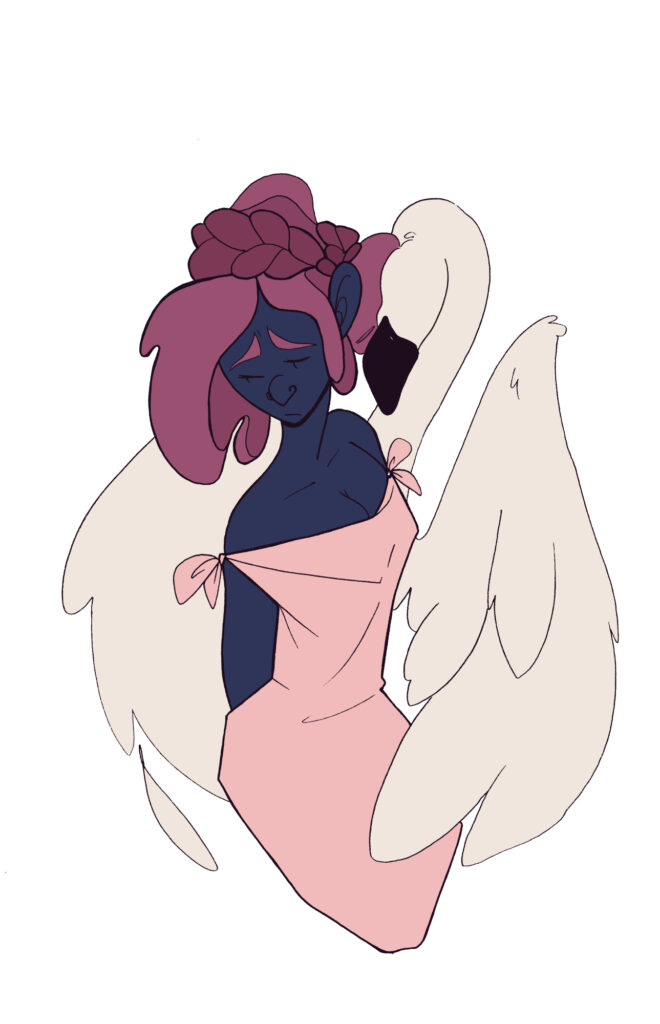
leda
(LEDA)
Best known for being the lady who was seduced by a swan.
In some versions of the myth Zeus created a scenario to woo Leda in which he was a swan ‘fleeing’ from an eagle in great terror. Leda perhaps thought it odd, but perhaps even odder still, the swan took refuge in her arms and somehow, in this fashion (or perhaps several action following this), Zeus as a swan and his new love, Leda consummated their love. Naturally, Zeus impregnated her in the process, however, when Leda gave birth it was to human children, yes, but in the form of actual eggs. She birthed from each egg, a set of twins: Helen (of Troy) and Clytemnestra, as well as Castor and Pollux.
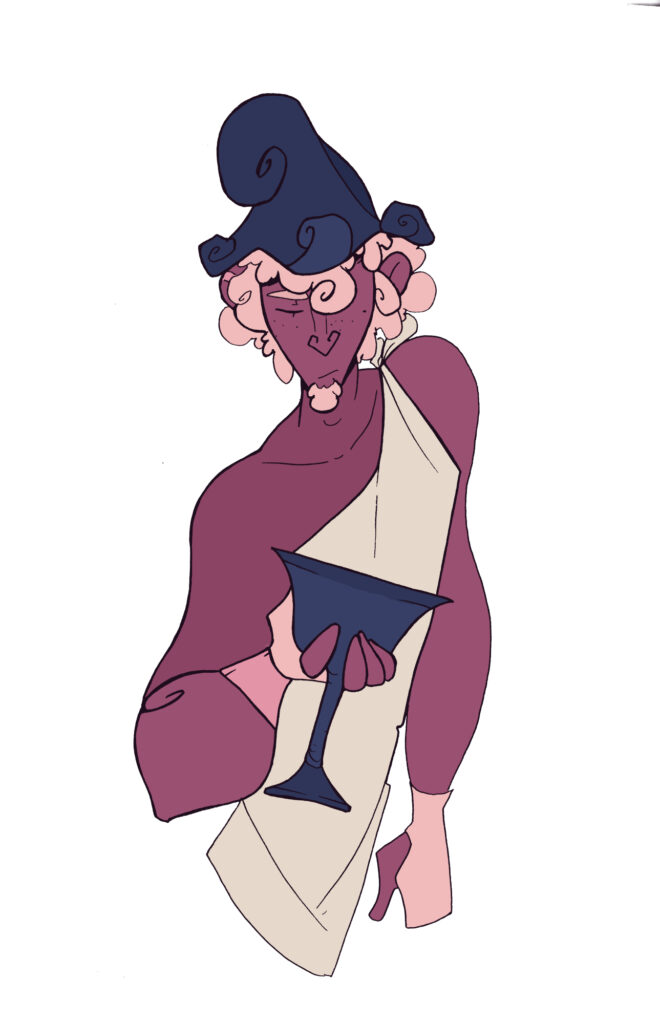
ganymedes
(GANYMEDES/GANYMEDE)
Best known for being kidnapped by Zeus.
In some versions of the myth, he was a divine hero of Troy and was considered to be one of the most beautiful mortals to ever walk the Earth. In all versions, Zeus becomes afflicted with the need to have this boy.
In one version Ganymedes was humbly tending to herds of his sheep until Zeus either sent or transformed into an eagle to abduct him and bring him home so that he could be the ‘cup-bearer’ of the gods. It was said that Ganymedes’ father was compensated with gorgeous horses of the same caliber immortals used in order to trade his son over to them. This worked and Ganymedes was sent off with Zeus.
Unfortunately, Hera grew quite jealous of Ganymedes so it really isn’t a very far stretch to assume that Zeus was quite fond of the mortal and perhaps showered him with much affection of his own. Eventually, Zeus had to secure Ganymedes’ safety by turning him into the constellation: Aquarius to keep him out of Hera’s reach.
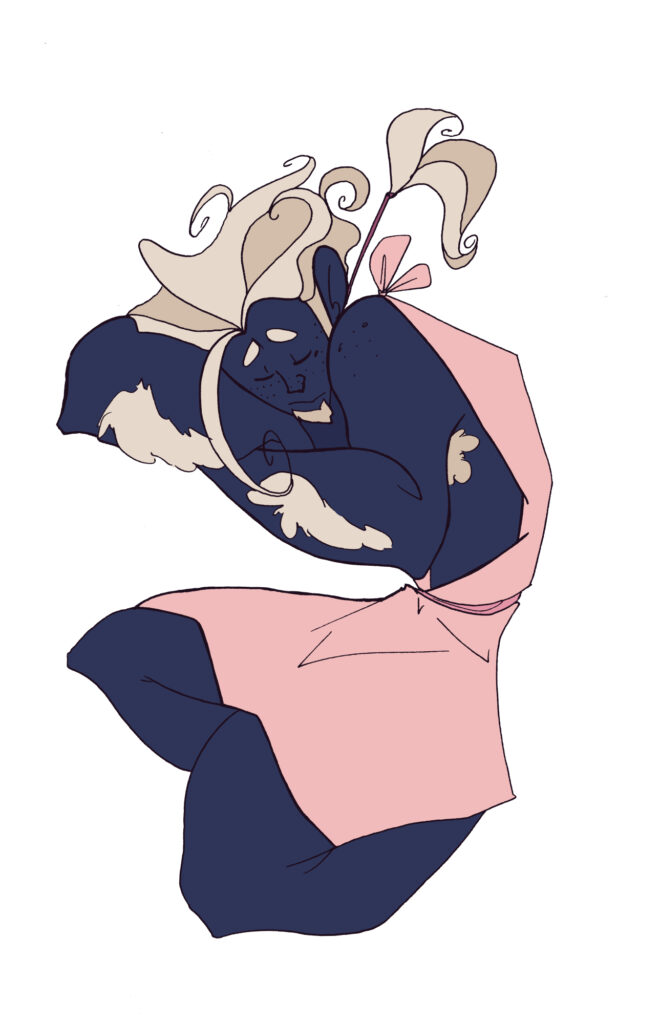
endymion
(ENDYMION)
Best known for doing a whole lot of sleeping.
In some versions of the myth Endymion was rather cursed to a really unfortunate fate. In both versions of his myth he was cursed to eternal sleep regardless of the gods who admired him.
The first, and most common version, is that with Selene. The titaness of the moon found him asleep and she thought he was the most beautiful mortal she had ever come to see. She asked for Zeus to immortalize this man in calm, sleeping pose. The olympian, a little confused by her request, complied all the same. Selene, quite grateful for this, went on to have fifty of Endymion’s children.
In another more obscure version, it was the primordial god, Hypnos who was in awe of Endymion’s beauty and coaxed the man into an open-eyed sleep so that his beauty could be admired by Hypnos for the entirety of eternity.
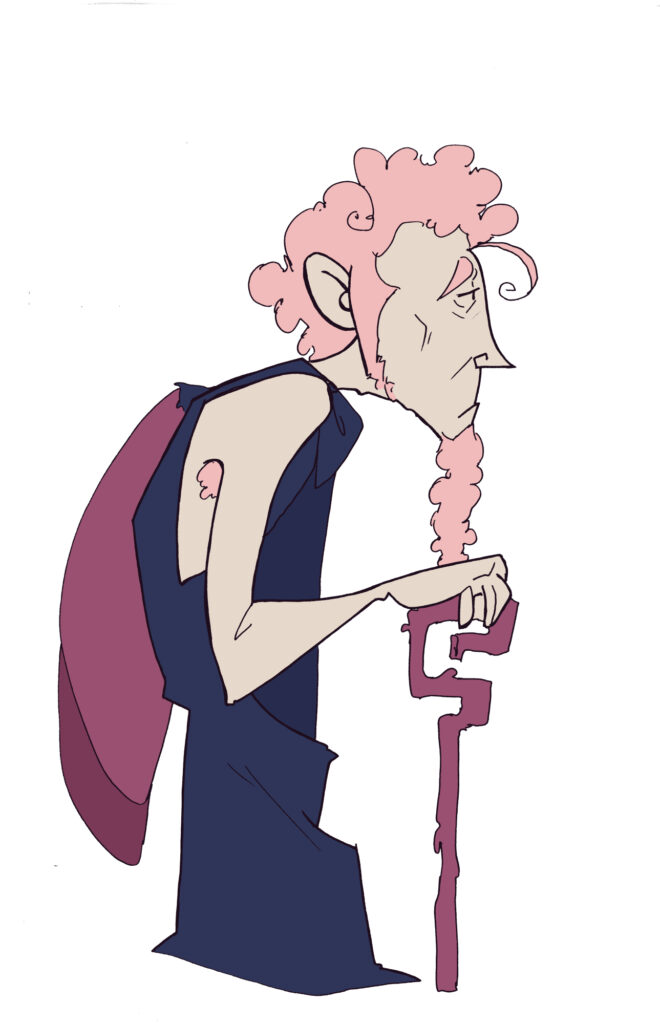
tithonos
(TITHONOS/TITHONUS)
Best known for being one of Eos’ ‘eternal lovers’.
In some versions of the myth he was kidnapped by Eos who was absolutely enthralled by Tithonos. Her love was so much so, she asked Zeus to make it so that he might live forever. Unfortunately, Zeus was feeling less than inclined to really grant her wish and although he agreed to do so, created a catch to the ordeal. Although he gave Tithonos eternal life he did not give him eternal youth and so Tithonos was forced to grow older and older and older and frailer and frailer and frailer. It was said that in her distaste with the outcome, Eos had to lock Tithonos in a room to avoid hearing his incoherent babbling. It was said he grew so old and shrivelled he eventually became a cicada, living forever while begging to die.
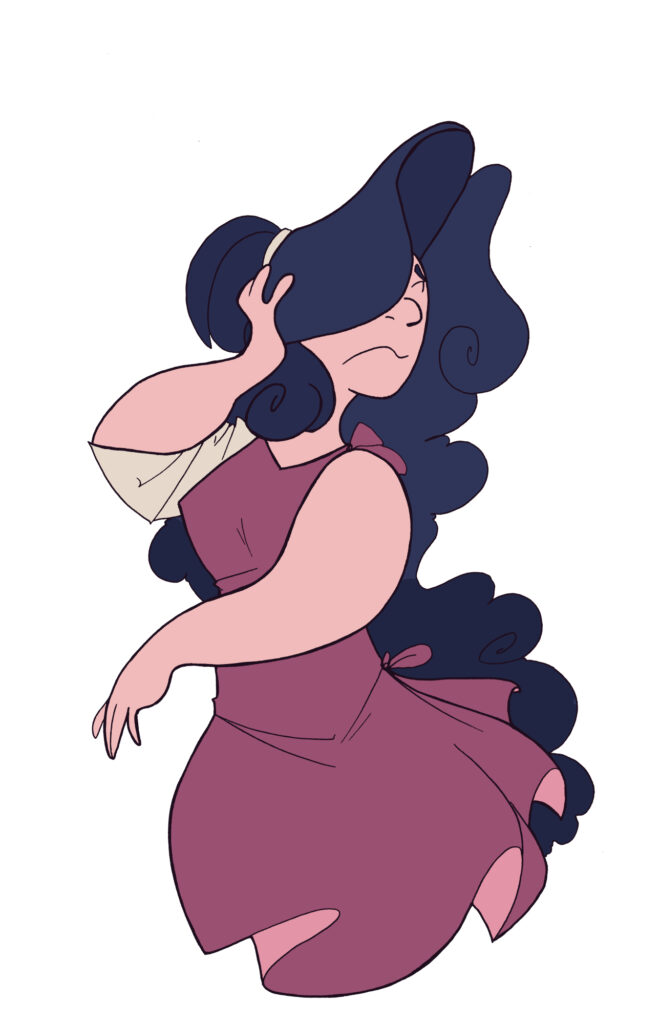
eurydice
(EURYDICE)
Best known for being Orpheus’ wife.
In some versions of the myth Eurydice was Orpheus’ wife and he loved her so dearly her married her, and, on their wedding day he played joyful songs for her. It was said that in her carefree dancing she stepped on a viper that killed her instantly with its bite. In other versions she was fleeing the advances of Pan and fell into a pit of vipers. Either way this sent Eurydice to the Underworld where Orpheus played the saddest of songs the entire time in his attempts to rescue her. This worked in his favour and while Haides and Persephone allowed him to leave with his wife on the condition he not turn to look at her until they were out of the Underworld. While Orpheus had stepped out, his wife had not and when he turned to greet her Eurydice was sent straight back to the Underworld.
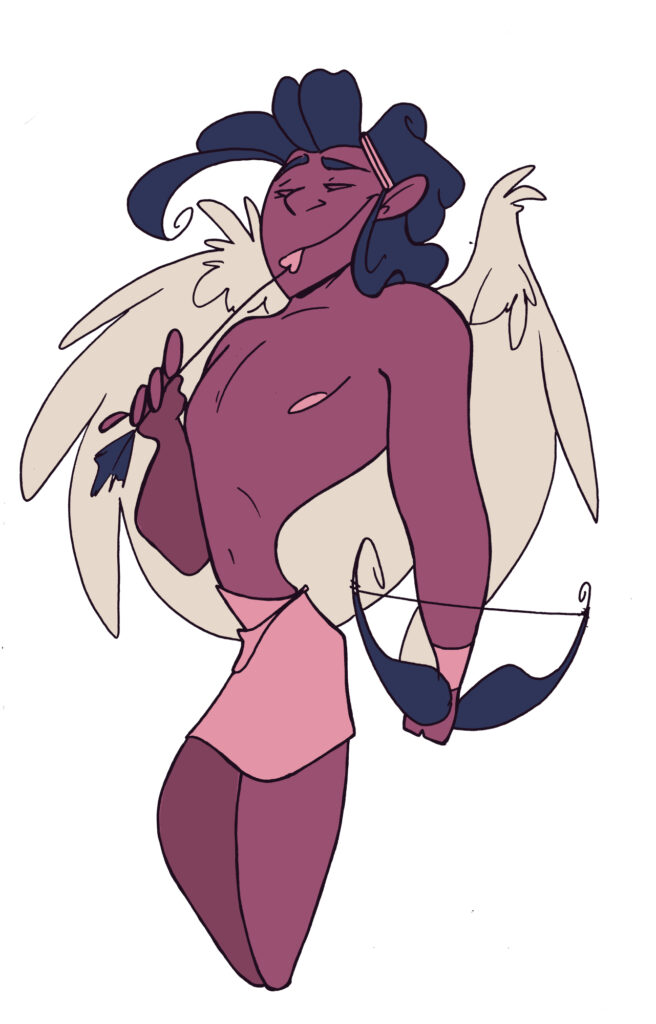
himeros
(HIMEROS/HIMERUS)
Best known for being the concept of impetuous love and/or pressing desire.
In some versions of the myth, he was one of Aphrodite’s sons and part of a group most folks called the Erotes. These Erotes were just a little flock of winged ‘groupies’ representing the flitting nature of sexual desire and the minor aspects of love. Himeros’ siblings who made up this group include: Hedylogos (or sweet-talk), Hymenaios (or bridal-hymn), Hermaphroditus (or effeminate/androgyne) and Pothos (or longing).
Himeros in particular was equipped with the traditional bow-and-arrow combination so that he could strike anyone he liked with insane sexual desire… Yes… it was most definitely a bow that made folks horny.
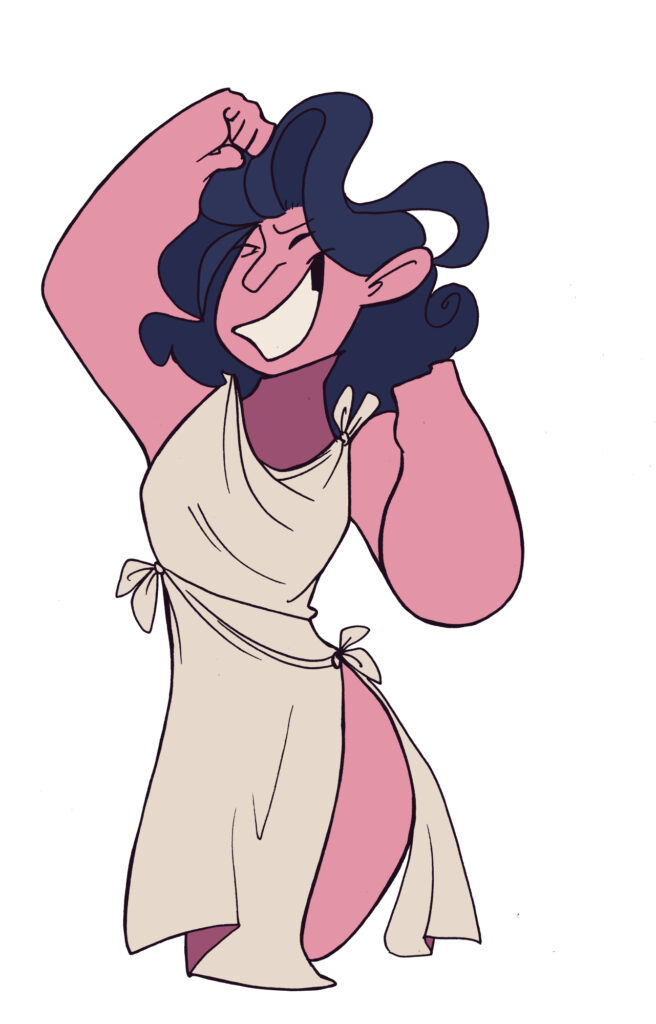
pasiphae
(PASIPHAE)
Best known for being that lady that wanted to make love to a bull.
In some versions of the myth, Pasiphae did, in fact, fall for a bull so hard she wished to make love to it. Essentially the story began with Poseidon who sent a massive white bull to Crete and because Pasiphae’s husband refused to sacrifice it (sacrificing one of his own mediocre bulls instead) Poseidon cursed Pasiphae to fall for this bull. She ordered Daedalos to construct a wooden bull with a cowskin draped around it so that she could hide inside it while the bull had its way with her. Daedalos, a little unnerved by this, did as he was commanded.
Pasiphae, as a result, gave birth to the minotaur, who was so vicious and ate only mortals, was then tossed into a labyrinth until he was killed by Theseus.
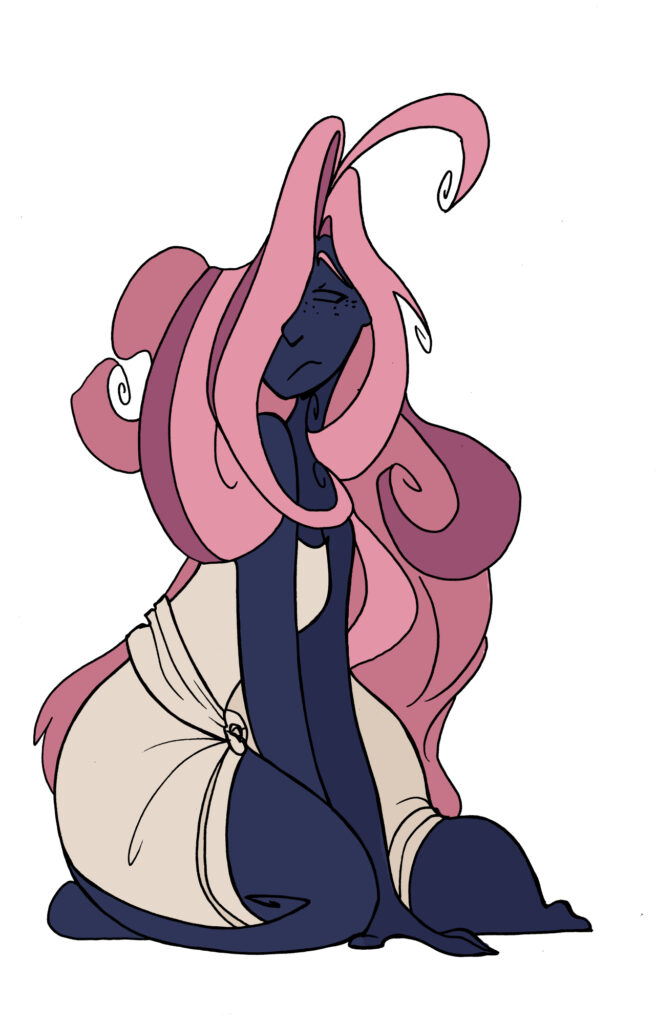
tyro
(TYRO)
Best known for being one of Poseidon’s love interests.
In some versions of the myth, she was infatuated with this river god, Enipeus who, himself, didn’t much like her and rejected her frequently. However, Poseidon was obscenely interested in Tyro to the point in which he disguised himself as Enipeus so that Tyro to made the mistake of dating him. Unfortunately for Tyro, this odd little plan of his worked and she gave birth to twin sons. Tyro, perhaps learning of their lineage to Poseidon (and figured out his little plan), came to dislike her sons enough that she left them at the top of a mountain to die. Luckily for the boys, a herdsman found them and raised them as his own. Unluckily for Tyro, her sons grew up to be rather vengeful and sought her out and killed her for their abandonment.
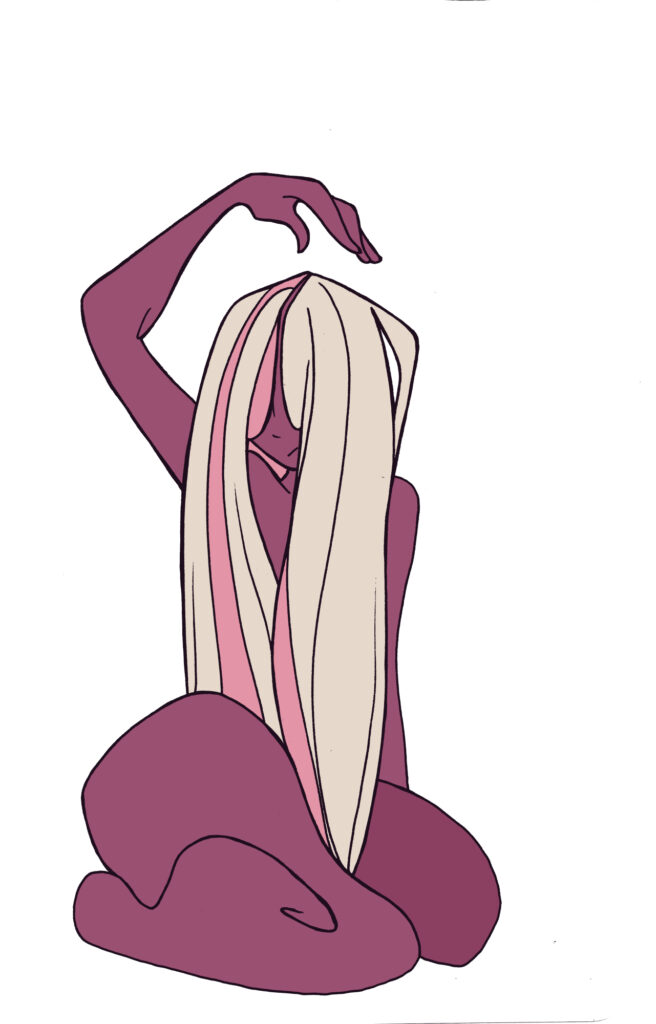
coronis
(CORONIS)
Best known for being Apollo’s consort.
In some versions of the myth, Coronis was courted by Apollo who made love to her and made her pregnant. Done with his duty, the god left her to her own devices, leaving only a single white raven to watch over her. Having been left by her beloved Apollo, Coronis fell in love and slept with another individual. This raven quickly made haste to inform Apollo whose rage not only targeted his messenger but Coronis herself. He demanded why the raven hadn’t done the duty of pecking her eyes out for her treachery and before the raven could reply he cursed its feathers black for the rest of eternity.
Not only this but, Apollo begged and begged Artemis to do his dirty deeds and to please kill Coronis, not satisfied until her corpse was on a burning pyre. Hindsight kicked in mid-way through the ceremony and he asked Hermes to cut Coronis’ baby free so that he could hand it off to Chiron to raise.
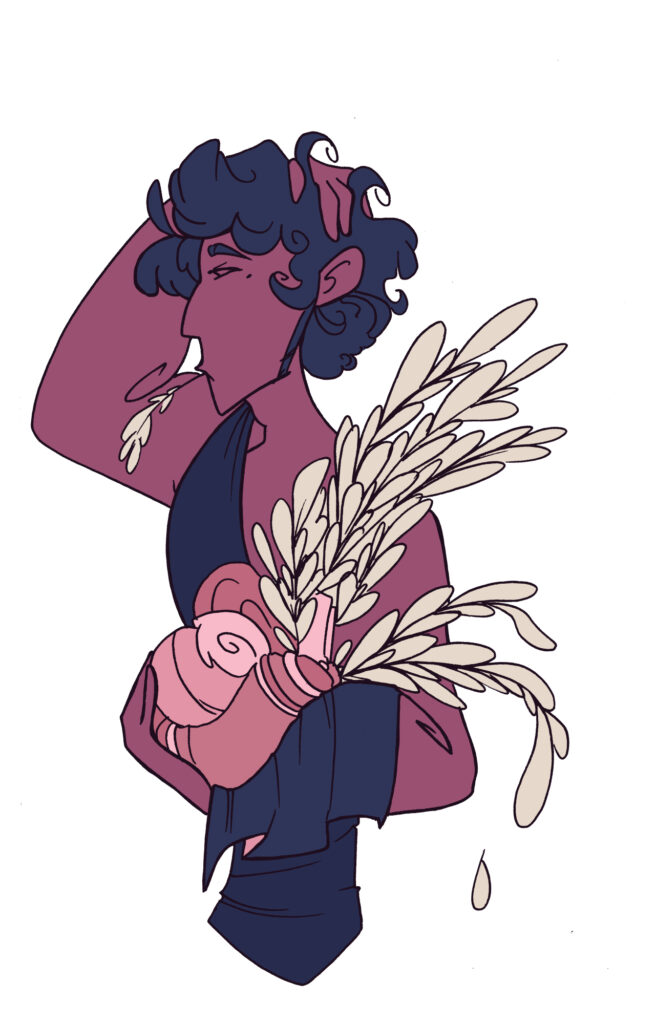
iasion
(IASION)
Best known for being the demigod of agriculture.
In some versions of the myth, during the wedding between Kadmos and Harmonia, Iasion was said to have caught the eye of Demeter who thought he was quite cute. Demeter sauntered over, introducing herself to him, allowing herself a moment of flirtation which quite quickly became so much more.
Seeing as Demeter was also one of Zeus’ many consorts, Zeus was oddly rather annoyed with the actions between the two. The god of gods dramatically cast a thunderbolt on Iasion killing him where he stood. Demeter, quite annoyed with this ordeal demanded Zeus give Iasion a much better fate than this and the god was persuaded to turn Iasion into the constellation Gemini, albeit, reluctantly.
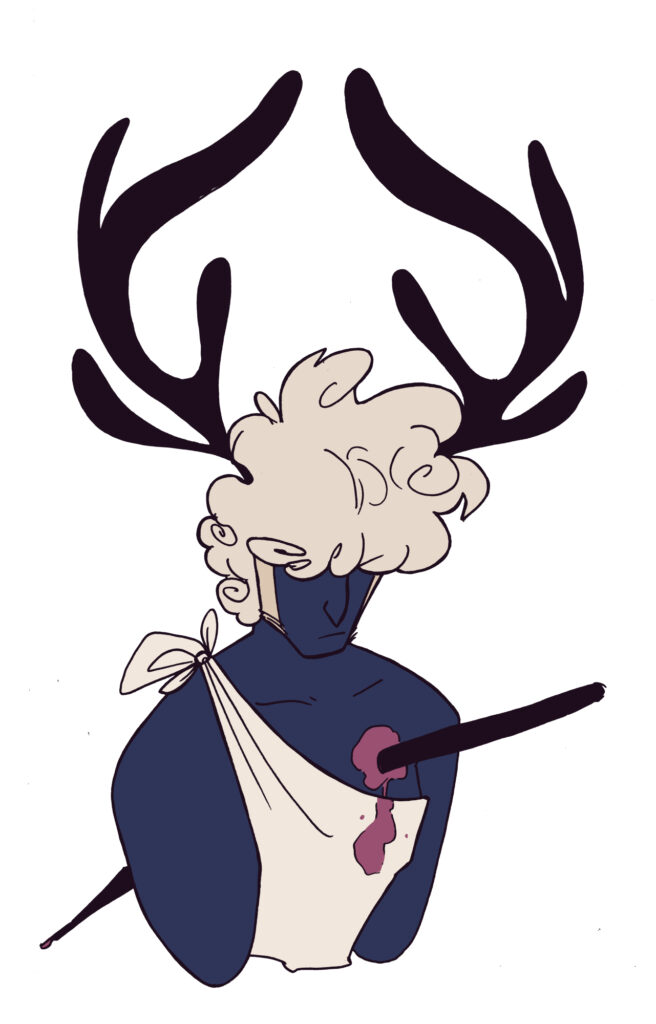
kyparissos
(KYPARISSOS/CYPARISSUS)
Best known for being a tamed stag.
In some versions of the myth, Kyparissos was a beautiful young man whose main companion was a stag in all his hunts and goings-on. One day the boy accidentally struck the stag with his javelin and killed it. So distraught by the entire thing, the boy mourned his lost friend and the grief was so potent that it turned Kyparissos into a cypress tree.
In other versions of the myth it was Apollo who fell in love with Kyparissos and mistaking his lover in the woods for an errant stag, accidentally struck him with a javelin straight through his heart. The god was completely destroyed… for a solid five minutes before he turned Kyparissos’ body into the cypress tree.
Both versions intermingle quite often in mythology and its retellings.
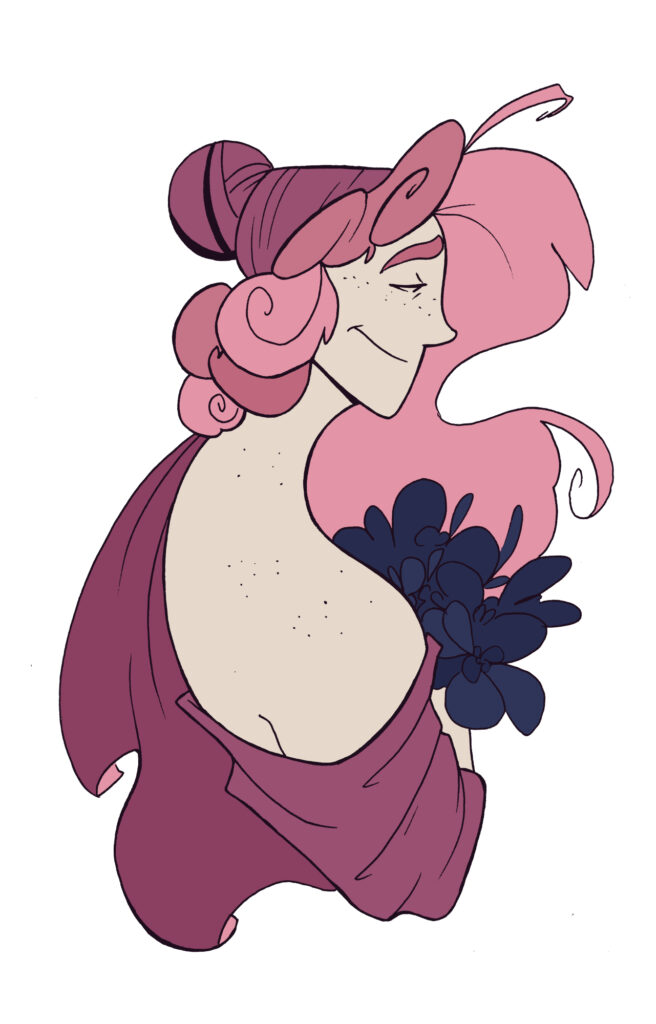
iphigenia
(IPHIGENIA)
Best known for being a princess of Argos.
In some versions of the myth, Iphigenia’s father, Agamemnon, offended Artemis and so the huntress goddess prevented him and his men from reaching Troy unless they sacrificed Iphigenia. As his daughter (a single person) was less important than his battalion and his effect on the war in Troy, he very much agreed to this. In some versions Iphigenia is killed.
In more interesting versions, Iphigenia is made into a sacrifice and Artemis then rescues her damsel, perhaps to introduce herself more fully. Artemis was in the great habit of saving and attempting to impress the women she thought were rather beautiful. Iphigenia’s story often ends with Artemis delivering her kindly to her brother.
In other endings, Iphigenia becomes a more permanent consort of Artemis herself.
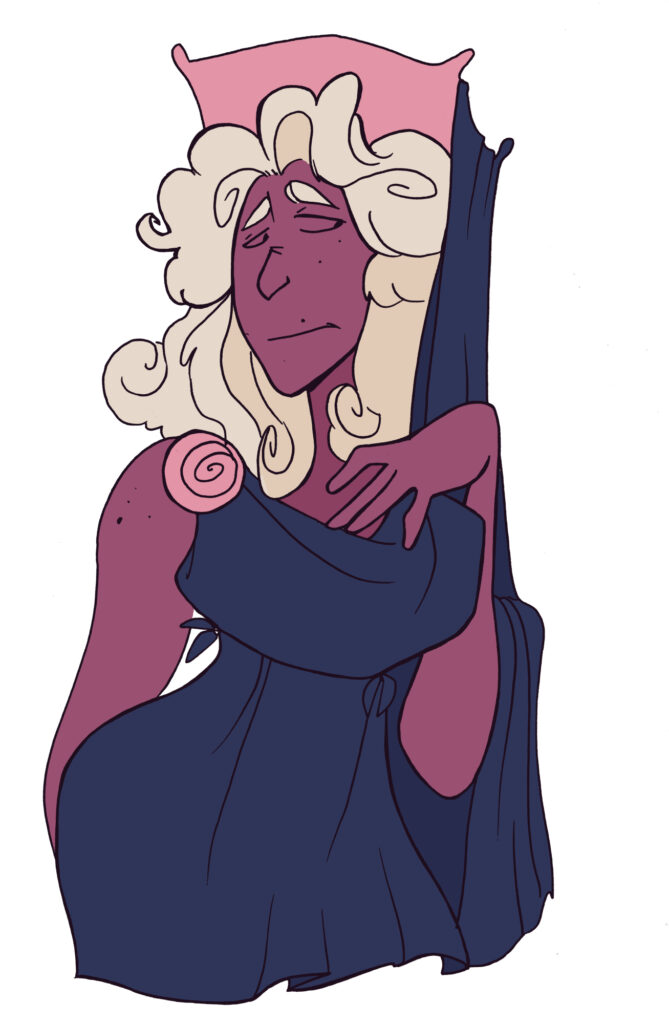
kybele
(CYBELE)
Best known for being the goddess of the living and fertility as well as a head figure in various cults.
In some versions of the myth she was known for being a very attractive goddess not only in Greek mythology but transcended into both Roman myths and Christian religions. She was a deity that was introduced into Greek Mythology via other cultures and was a very strange character. Most equated her following to that of Dionysos and most ancients, while they enjoyed the festivities surrounding her, kept her at arm’s length.
In her most popularly-known myth, Kybele was, so beautiful she happened to catch the eye of Zeus who became quickly attracted to her. She rejected any and all his advances which was not all too surprising considering Zeus’ track record with women up until this point. Regardless of her rejections, Zeus continued his advances and made attempt to go further, pulling his penis out to have sex with her only for her to turn away in disgust before was able to ejaculate, causing him to ejaculate on a rock.
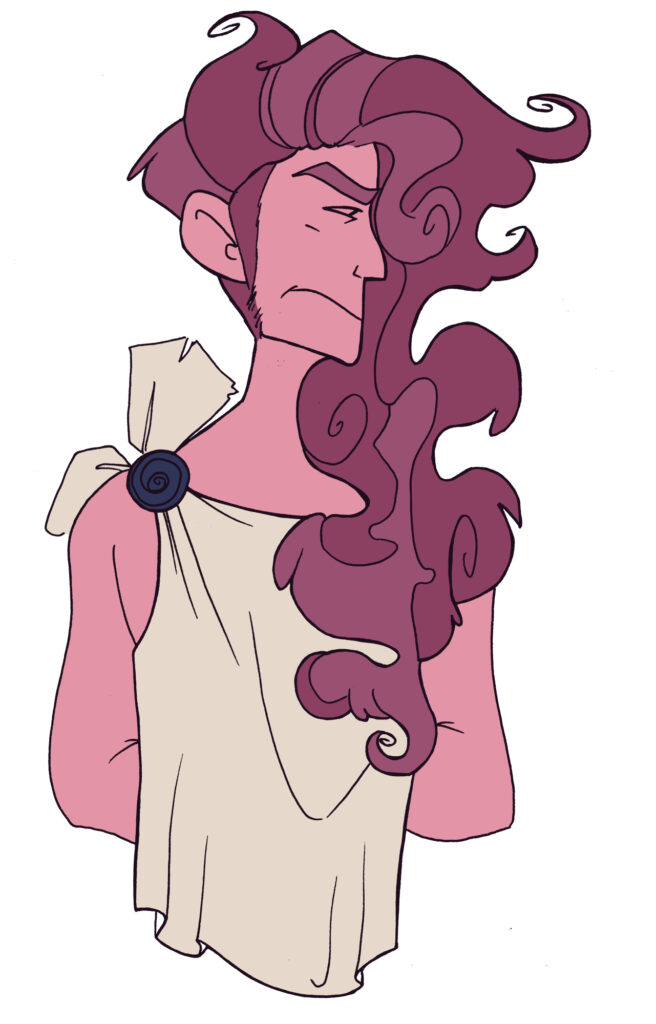
ACDESTIS
(ACDESTIS, AGDISTIS)
Best known for being a powerful figure with two types of genitalia.
In some versions of the myth, they were birthed from a rock that was ‘impregnated with Zeus’s sperm’ which created them, a majestic intersex individual known popularly as: Acdestis. Supposedly they were deemed far too powerful because they had two types of commonly known genitalia (penis & vagina) and so various gods were very threatened by this power. They sought Dionysos’ (sometimes Hermes’) help to castrate them. They bound Acdestis’ foot to their penis so that when they woke and made to stand/stretch they tore it straight off. It was said that after this, when their penis hit the ground, it fertilized this ground and created a pomegranate tree (sometimes an almond tree).
Later, a woman found this tree, plucked one of the pomegranates from the branches and pressed it to her breasts and, somehow, this impregnated her with Attis.
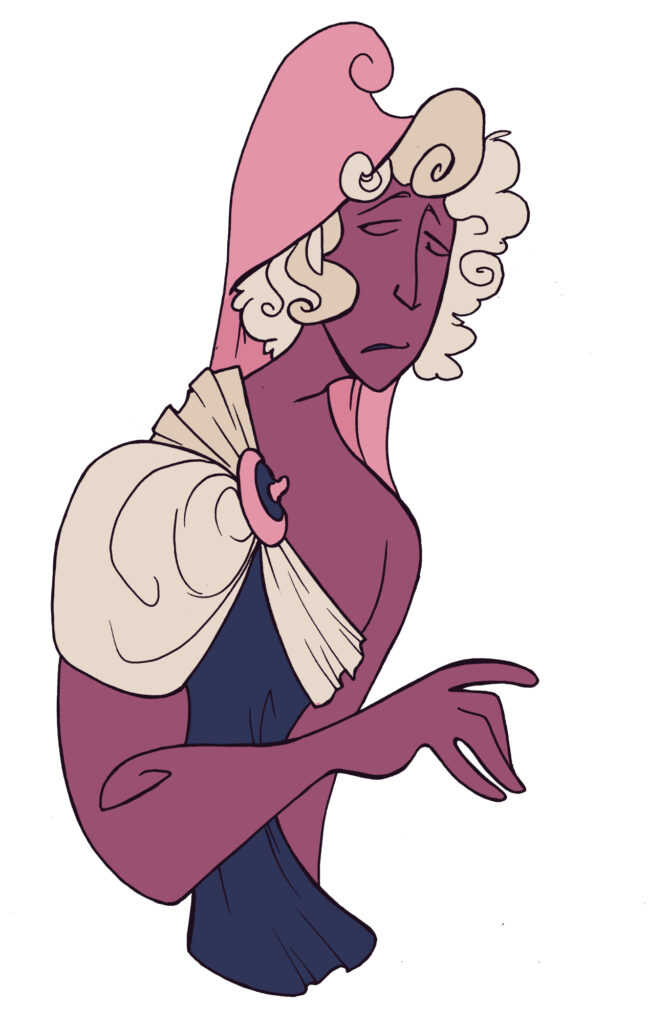
attis
(ATTIS)
Best known for having several cults and festivals in his name.
In some versions of the myth, Attis’ story follows that of Acdestis: A woman who plucked the pomegranate from the tree that grew from the fertile soil of his penis, and pressed the fruit to her breast, gave birth to Attis. He grew into a very handsome boy and was, very unfortunately, left behind in the woods by his mother and was, instead, raised by a humble farmer.
Admittedly this child had a very decent life, his guardian, Acdestis watching him from afar. Attis went about his life unknowingly, met a woman, fell in love with her, asked her for her hand in marriage…
Attis’ wedding day was certainly a party, Acdestis showed up to denounce the entire ordeal and in their monstrous-like rage caused all the wedding patrons to go insane, including Attis. This insanity grew so large patrons were killing one another, Attis castrated himself and killed himself in the process.
Kybele in all this stood by watching, saddened and buried Attis’ penis so that it could grow into an almond tree. Acdestis mourned Attis and prayed for the youth’s revival to which, a scorned Zeus only made Attis’ body unable to decompose.
MAIN PAGE | PRIMORDIALS | TITANS | GODS | HEROES | LADIES | MONSTERS